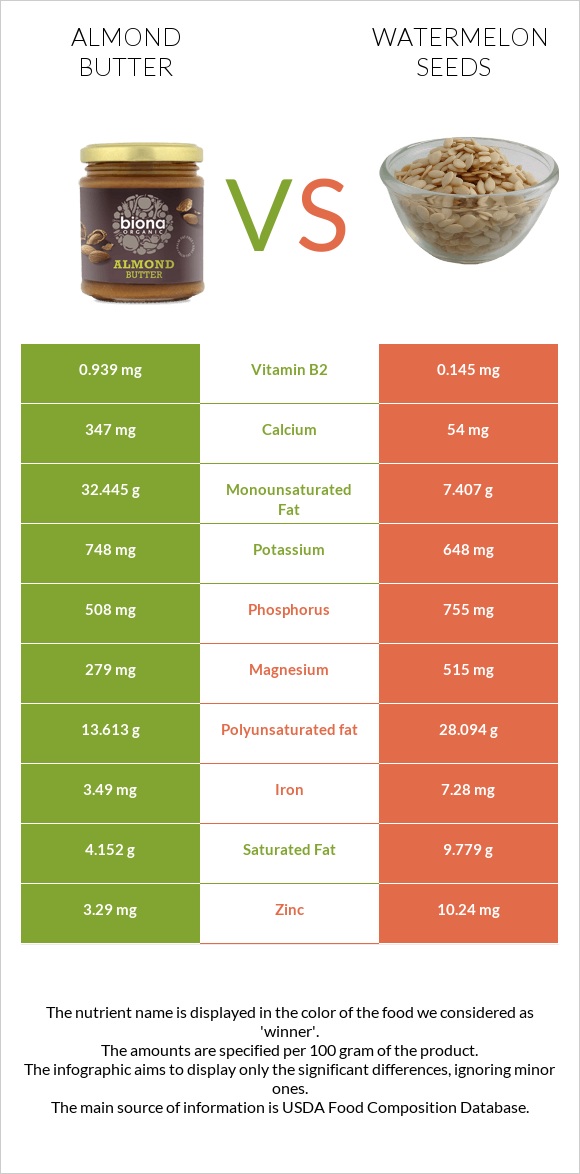Almond butter vs. Watermelon seeds — In-Depth Nutrition Comparison
Compare
How are almond butter and watermelon seeds different?
- Almond butter is higher in vitamin B2, calcium, copper, and manganese; however, watermelon seeds are richer in zinc, magnesium, iron, phosphorus, and vitamin B1.
- Daily need coverage for zinc for watermelon seeds is 63% higher.
- Almond butter contains 6 times more vitamin B2 than watermelon seeds. While almond butter contains 0.939mg of vitamin B2, watermelon seeds contain only 0.145mg.
- Almond butter has less saturated fat.
Nuts, almond butter, plain, without salt added and Seeds, watermelon seed kernels, dried are the varieties used in this article.
Infographic

Infographic link
Mineral Comparison
Mineral comparison score is based on the number of minerals by which one or the other food is richer. The "coverage" charts below show how much of the daily needs can be covered by 300 grams of the food.
| Contains more CalciumCalcium | +542.6% |
| Contains more PotassiumPotassium | +15.4% |
| Contains more CopperCopper | +36.2% |
| Contains less SodiumSodium | -92.9% |
| Contains more ManganeseManganese | +32% |
| Contains more SeleniumSelenium | +∞% |
| Contains more MagnesiumMagnesium | +84.6% |
| Contains more IronIron | +108.6% |
| Contains more ZincZinc | +211.2% |
| Contains more PhosphorusPhosphorus | +48.6% |
Vitamin Comparison
Vitamin comparison score is based on the number of vitamins by which one or the other food is richer. The "coverage" charts below show how much of the daily needs can be covered by 300 grams of the food.
| Contains more Vitamin EVitamin E | +∞% |
| Contains more Vitamin B2Vitamin B2 | +547.6% |
| Contains more Vitamin B6Vitamin B6 | +15.7% |
| Contains more Vitamin B1Vitamin B1 | +363.4% |
| Contains more Vitamin B3Vitamin B3 | +12.5% |
All nutrients comparison - raw data values
| Nutrient |  |
 |
DV% diff. |
| Vitamin E | 24.21mg | 161% | |
| Polyunsaturated fat | 13.613g | 28.094g | 97% |
| Zinc | 3.29mg | 10.24mg | 63% |
| Monounsaturated fat | 32.445g | 7.407g | 63% |
| Vitamin B2 | 0.939mg | 0.145mg | 61% |
| Magnesium | 279mg | 515mg | 56% |
| Iron | 3.49mg | 7.28mg | 47% |
| Fiber | 10.3g | 41% | |
| Phosphorus | 508mg | 755mg | 35% |
| Calcium | 347mg | 54mg | 29% |
| Copper | 0.934mg | 0.686mg | 28% |
| Saturated fat | 4.152g | 9.779g | 26% |
| Manganese | 2.131mg | 1.614mg | 22% |
| Protein | 20.96g | 28.33g | 15% |
| Fats | 55.5g | 47.37g | 13% |
| Vitamin B1 | 0.041mg | 0.19mg | 12% |
| Choline | 52.1mg | 9% | |
| Sodium | 7mg | 99mg | 4% |
| Selenium | 2.4µg | 4% | |
| Calories | 614kcal | 557kcal | 3% |
| Potassium | 748mg | 648mg | 3% |
| Vitamin B3 | 3.155mg | 3.55mg | 2% |
| Carbs | 18.82g | 15.31g | 1% |
| Vitamin B5 | 0.318mg | 0.346mg | 1% |
| Vitamin B6 | 0.103mg | 0.089mg | 1% |
| Folate | 53µg | 58µg | 1% |
| Net carbs | 8.52g | 15.31g | N/A |
| Sugar | 4.43g | N/A | |
| Starch | 0.08g | 0% | |
| Tryptophan | 0.159mg | 0.39mg | 0% |
| Threonine | 0.555mg | 1.112mg | 0% |
| Isoleucine | 0.813mg | 1.342mg | 0% |
| Leucine | 1.483mg | 2.149mg | 0% |
| Lysine | 0.612mg | 0.887mg | 0% |
| Methionine | 0.122mg | 0.834mg | 0% |
| Phenylalanine | 1.149mg | 2.031mg | 0% |
| Valine | 0.937mg | 1.556mg | 0% |
| Histidine | 0.55mg | 0.775mg | 0% |
Macronutrient Comparison
Macronutrient breakdown side-by-side comparison
Protein:
20.96 g
Fats:
55.5 g
Carbs:
18.82 g
Water:
1.64 g
Other:
3.08 g
Protein:
28.33 g
Fats:
47.37 g
Carbs:
15.31 g
Water:
5.05 g
Other:
3.94 g
| Contains more FatsFats | +17.2% |
| Contains more CarbsCarbs | +22.9% |
| Contains more ProteinProtein | +35.2% |
| Contains more WaterWater | +207.9% |
| Contains more OtherOther | +27.9% |
Fat Type Comparison
Fat type breakdown side-by-side comparison
Saturated fat:
Sat. Fat
4.152 g
Monounsaturated fat:
Mono. Fat
32.445 g
Polyunsaturated fat:
Poly. Fat
13.613 g
Saturated fat:
Sat. Fat
9.779 g
Monounsaturated fat:
Mono. Fat
7.407 g
Polyunsaturated fat:
Poly. Fat
28.094 g
| Contains less Sat. FatSaturated fat | -57.5% |
| Contains more Mono. FatMonounsaturated fat | +338% |
| Contains more Poly. FatPolyunsaturated fat | +106.4% |





